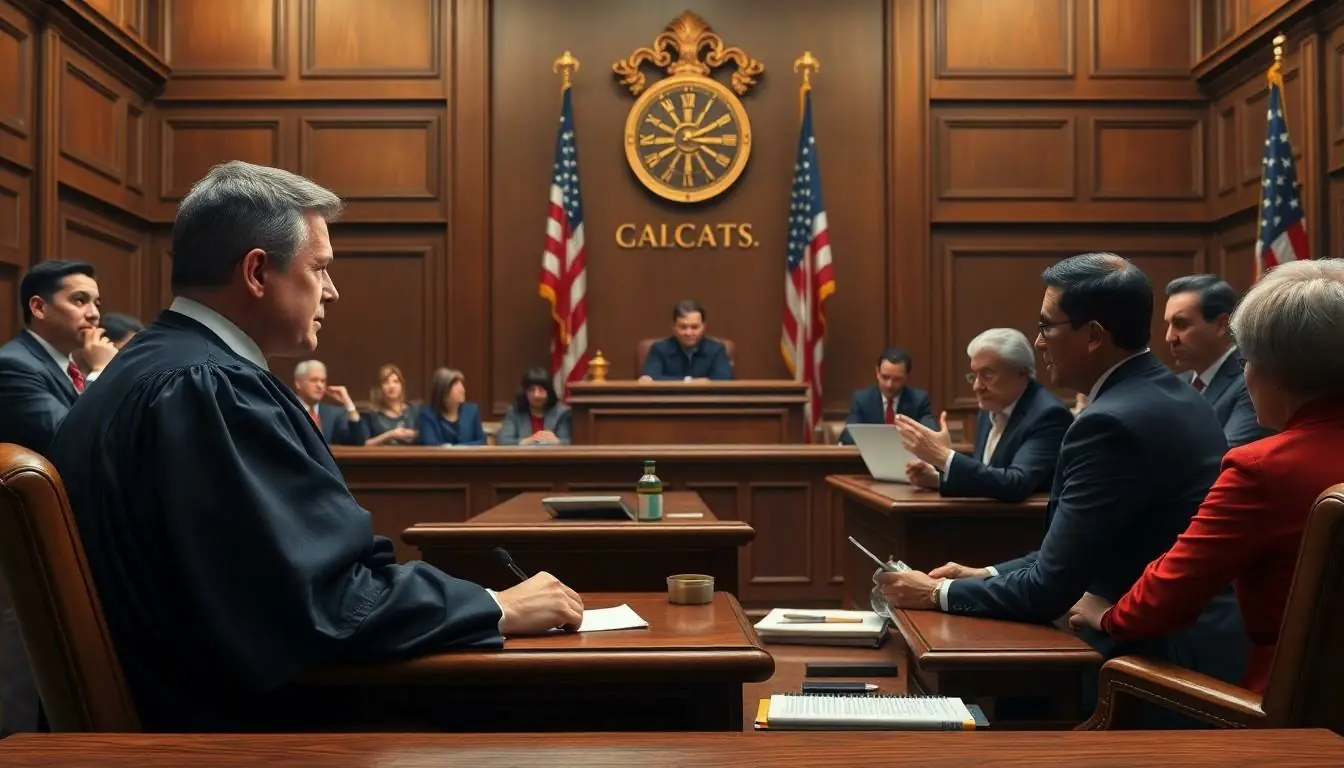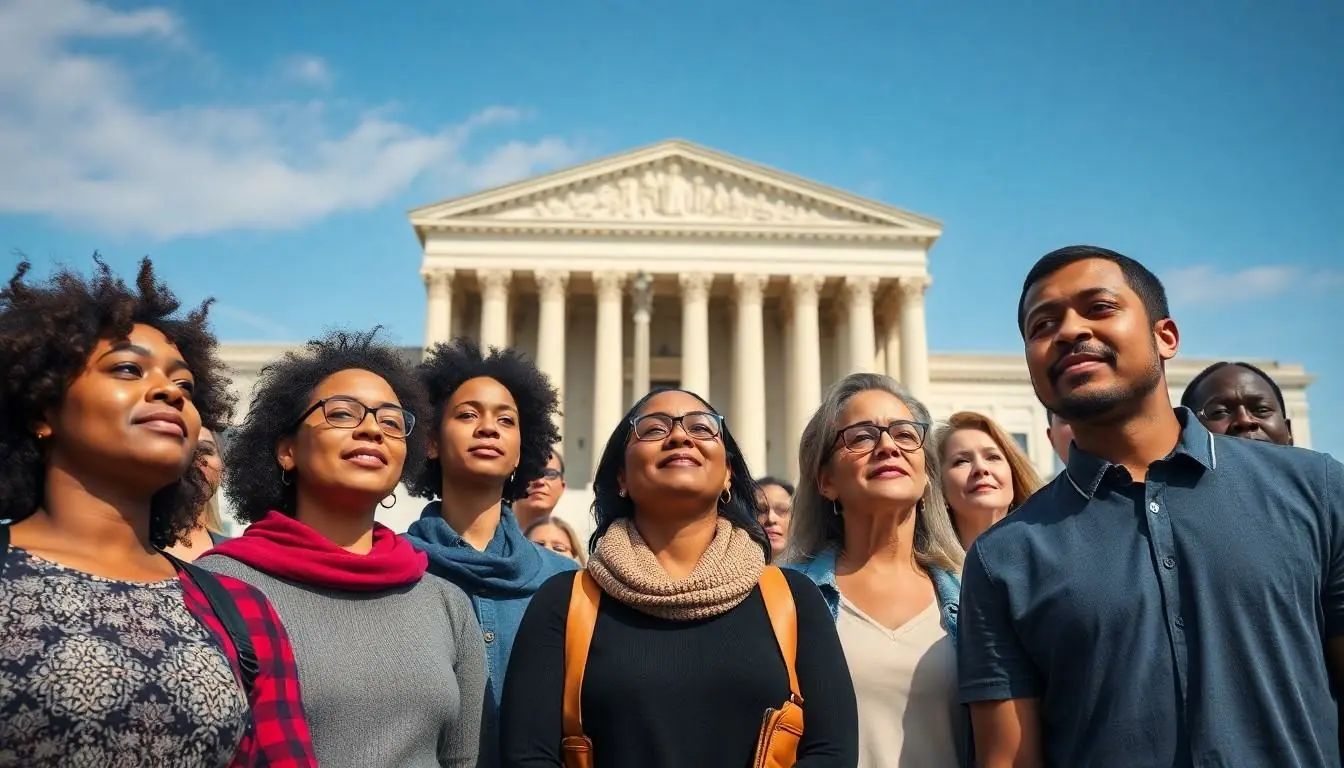In a world where judges occasionally don capes instead of robes, the phenomenon of “legislating from the bench” has become a hot topic. Picture this: a courtroom transforms into a stage where judges not only interpret the law but also take on the role of lawmakers. It sounds like a legal drama, but it’s a reality that sparks debate and raises eyebrows.
Some argue that this judicial creativity is essential for justice, while others see it as judges overstepping their bounds. Whether it’s a heroic act of defending rights or a villainous twist in the legal saga, the implications are far-reaching. So, grab your gavel and get ready to explore the fine line between interpreting the law and making it. Who knew the courtroom could be so entertaining?
Table of Contents
ToggleUnderstanding Legislating From The Bench
Judges may adopt a role that extends beyond interpreting laws. This practice, known as legislating from the bench, raises critical questions about judicial power and responsibility.
Definition and Overview
Legislating from the bench occurs when judges make decisions that address societal issues, effectively creating law rather than applying it. Many see this as a necessary intervention in cases where legislative bodies fail to act. Others consider it an infringement on the separation of powers. Courts may step in during cases involving civil rights, environmental regulations, or social justice, impacting policy outcomes directly through rulings. This approach shapes legal precedents, influencing future cases and legislation.
Historical Context
The roots of legislating from the bench trace back to landmark Supreme Court cases. Significant decisions, such as Brown v. Board of Education (1954), exemplify judicial activism aimed at promoting social change. Historical examples illustrate the judiciary’s role in advancing rights when legislatures lag behind. The New Deal era also witnessed increased judicial interventions as courts sought to address economic disparities. Over the decades, this practice fluctuated, reflecting broader societal values and priorities regarding the law and justice. Such historical moments lay the groundwork for today’s discussions about judicial overreach and accountability.
Key Cases Illustrating Legislating From The Bench
Several key cases exemplify the practice of legislating from the bench. The decisions reflect how judicial interpretations can reshape laws and policies.
Landmark Supreme Court Decisions
Brown v. Board of Education (1954) stands out as a pivotal case in which the Supreme Court declared racial segregation in public schools unconstitutional. Roe v. Wade (1973) further illustrates judicial activism by establishing a woman’s right to choose regarding abortion, thereby influencing reproductive rights across the nation. Obergefell v. Hodges (2015) served to legalize same-sex marriage, marking a significant societal shift in the recognition of LGBTQ+ rights. Each case demonstrates the judiciary’s role in enacting change when legislative bodies are hesitant.
Implications of These Cases
These landmark rulings provoke ongoing debates about the balance of power among branches of government. Judicial decisions in these instances directly affect civil rights, expanding protections for marginalized groups. Critics argue that such interventions undermine legislative authority by circumventing established processes. Conversely, supporters contend that judicial action is crucial when legislative inaction endangers fundamental rights. Overall, these cases highlight both the responsibilities and challenges faced by the judiciary in addressing contemporary social issues.
Arguments For Legislating From The Bench
Judges often act to address gaps in legislation, providing essential protections for individual rights. This judicial role can safeguard vulnerable populations when legislatures fail to act.
Protection of Rights
Judges play a crucial role in upholding civil liberties and addressing injustices. Landmark decisions like Brown v. Board of Education exemplify how courts can rectify discrimination when legislative actions are inadequate. Courts frequently step in to ensure all individuals receive equal protection under the law. They often interpret constitutional rights to align with contemporary values, which can reshape the legal landscape. In cases involving free speech or reproductive rights, judges have often prioritized fundamental freedoms that legislatures might overlook. Judicial intervention becomes necessary when legislative bodies resist change, thereby promoting social justice and equity.
Checks on Legislative Power
Judicial review serves as a significant mechanism for maintaining balance within government. Courts can check legislative actions perceived as unconstitutional, ensuring compliance with established rights. This oversight helps prevent tyranny by safeguarding against the infringement of individual liberties. When legislatures act contrary to the principles of justice, judges can intervene to uphold higher legal standards. Such actions protect democracy by ensuring that lawmakers cannot overstep their bounds unchecked. Judicial activism often acts as a counterbalance to potential governmental overreach, promoting accountability in legislative processes.
Arguments Against Legislating From The Bench
The practice of legislating from the bench raises significant concerns about the integrity of the judicial system. Critics argue it disrupts the separation of powers, an essential principle designed to prevent any one branch of government from overpowering the others.
Separation of Powers Concerns
Judicial overreach undermines legislative authority effectively. Courts, when rendering decisions beyond interpreting the law, may inadvertently encroach on the roles of elected representatives. Elected bodies are tasked with creating laws that reflect the will of the people. This confusion between the roles of judges and legislators poses challenges in maintaining a balanced government structure. Clear delineation of responsibilities protects democracy and ensures accountability in law-making processes.
Influence on Judicial Integrity
The integrity of the judiciary suffers when judges engage in legislating from the bench. Such actions can erode public trust, leading to perceptions that judges impose their personal beliefs instead of adhering strictly to legal texts. Integrity relies on impartiality, which can be compromised when courts appear to legislate rather than interpret. Furthermore, rendering decisions that create law rather than apply it risks politicizing the judiciary, diminishing its role as an unbiased arbiter. Confidence in the judicial system hinges on its ability to remain a neutral entity, free from political influence and personal ideologies.
Conclusion
The practice of legislating from the bench continues to provoke intense debate within legal and political spheres. As judges navigate their roles in interpreting laws while addressing pressing societal issues, the implications of their decisions resonate far beyond the courtroom. Balancing judicial power with legislative authority remains a critical challenge.
Public trust in the judiciary hinges on its perceived impartiality and adherence to legal principles. As society evolves, the judiciary’s role in safeguarding rights and promoting justice will likely remain a focal point of discussion. Understanding the dynamics of this practice is essential for fostering informed conversations about the future of law and governance.




